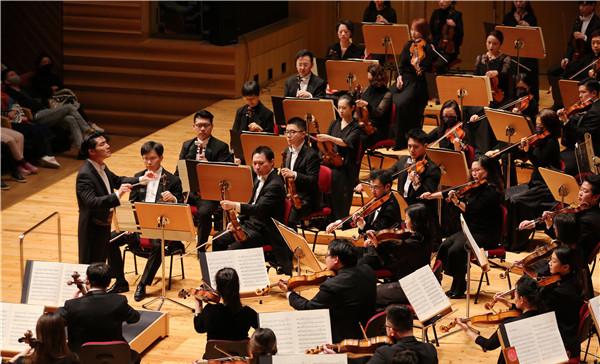Last night, the Shanghai Symphony Orchestra, under the baton of Chinese conductor Hong Yiquan, performed Austrian composer Alexander Zemlinsky's The Little Mermaid, the premiere of the work in Chinese mainland. "The Little Mermaid" is Zemlinsky's most popular work, and behind it is Zemlinsky's frustrated love affair.
"Although the little mermaid used everything in exchange for a brief chance to get along with her lover, she was unable to keep her lover's eyes still and turned into a bubble at sea in the early morning of the next day." When Asked about the handling of this work, Hong Yiquan spent nearly 20 minutes recounting the fairy tale in detail, and he wanted to convey not only the tragic color of the work throughout, but also the complex emotions of the composer Zemlinsky when he wrote this tragic song.

Photo: Zemlinski's "The Little Mermaid" premiered in Chinese mainland Courtesy of the organizer (the same below)
The birth of "The Little Mermaid" stemmed from Zemlinsky's frustrated love affair, he fell in love with Alma Schindler but failed to capture the heart, and eventually married another composer of the same period, Mahler. The devastated Zemlinsky borrowed Hans Christian Andersen's The Little Mermaid to commemorate his feelings that had nowhere to go. Born in 1903, this work has been successfully performed in Vienna, Prague and Berlin, but it has not given the composer greater fame and prestige, and it is still rarely seen on the stage.
Hong Yiquan said: "'The Little Mermaid' is rarely performed in the world, and a very important reason is that Zemlinsky writes music very hard, testing both the skills of the players and the balance of the band. Hong Yiquan was pleasantly surprised by the shanghai symphony orchestra's performance standards and professionalism: "They can feel the emotions behind the music, and they can also interpret them appropriately." ”
"The Little Mermaid" is about 40 minutes long, with gorgeous instrumentation, with late romantic characteristics, both story and picture sense. Although Zemlinsky's prestige and status were covered by Mahler's aura before and after his death, in the view of the music critic Lebrecht, his work remained "a kaleidoscopic, cross-cultural, multicultural mixture." It's a voice from somewhere else." Lebrecht firmly believed that the era that belonged to Zemlinsky would come.
Last night, Hong Yiquan's performance was also amazing, the Singapore-born conductor, at the age of 14, because of a dream to establish his ideal of being a conductor, although before that he even gave up the piano, but with extraordinary talent, but in a short period of time quickly improved his musical cultivation. He has studied in Vienna, St. Petersburg and other places, and was the first conducting student in the history of Yale University in the United States to receive a full scholarship. In a short period of time, it has become the leader of the new generation of conductors in the world today.
Not only does he have a bully physique in the field of music, Hong Yiquan is also a master of languages, and he can use English, German, French, Italian, Russian and Chinese fluently. Asked about the know-how to learn languages, he said that the most important thing is to "not be afraid of making mistakes": "Communicate with people in different languages, and I will immediately use each other's languages." If you're afraid of making mistakes, you'll never be able to open your mouth. Another is to learn to think in different languages, rather than acting as a translator forever. ”
In Hong Yiquan's view, whether it is learning music or language, good "communication" is needed. A good conductor must be a good communicator and leader: "Because you're not going to teach a musician how to play the piano, you need to convey your ideas precisely while understanding the musicians." (Xinmin Evening News reporter Zhu Yuan)